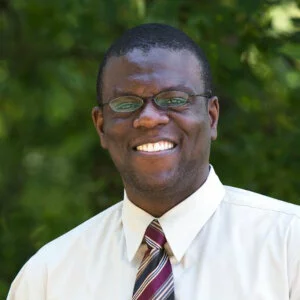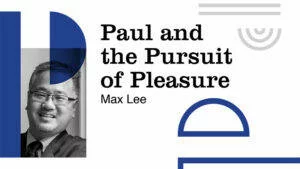I teach theology at a Christian liberal arts college. My students often hear me long for those halcyon days when theology reigned as Queen of the Sciences. To have colleagues from non-theological disciplines bowing down and kissing my ring—ay, there’s tenure worth having!
I crash-landed in reality, however, as I worked through these insightful essays covering a range of scientific disciplines. The daunting complexity of interdisciplinary dialogue is not for the faint of heart. I was suddenly ready to play the role of a chastened servant rather than ring-bearing sovereign.
I am grateful for this exchange and the opportunity to learn from my interlocutors. In what follows, I make selective remarks on each piece and then offer concluding reflections as a Reformed theologian.
Some Reflections on Cresswell
According to Cresswell, the psychological thesis that humans are determined is self-referentially incoherent. Psychologists advocating that idea in research papers operate as if they themselvesI agree that modeling psychology on the hard sciences benefits from the strengths of those disciplines. However, we should also recognize the intrinsic limits with this strategy. escape the dynamic. Only they are able to transcend it all and reflect self-consciously on human behavior. How is that possible, given their thesis? This is special pleading and thus we need not take their claims seriously.
At one point, Cresswell cites a comment by a group of researchers: “psychology simultaneously pursues an agenda modeled after the hard sciences.” That is, psychologists take natural sciences like physics and chemistry as the gold standard and then try to pattern their own discipline along those lines. I find that telling. Why do these researchers think that modeling psychology after the hard sciences is the most helpful or reliable method to understand human persons? I agree that modeling psychology on the hard sciences benefits from the strengths of those disciplines. However, we should also recognize the intrinsic limits with this strategy. Failing to do so risks reductionism. Christian faith allows us to remove the naturalist veil and realize there is much more to the human person than reductive psychology could ever imagine.
Some Reflections on Runyan
True confession: I have always been instinctively skeptical of Libet’s experiment and similar neuroscientific studies. Reading the literature often gives the impression that experimental results are epistemically superior to other forms of knowing. I doubt that. I would be surprised if such experiments can reveal anything decisive about human freedom. They cannot even detect the human soul, a significant incapacity if dualism is true. I therefore agree with Runyan that such experiments are inherently limited.
How limited though? Runyan writes: “Libet’s experiment helps delineate the kind of free will we might plausibly have.” Runyan’s assessment is modest and realistic, unlike much of the literature in his survey. Perhaps ungratefully, though, I’m still left wondering whether even that modest judgment is too optimistic in light of questions surrounding theological anthropology: What kinds of creatures are we? Specifically, should we be dualists or physicalists? The neuroscientific studies that Runyan surveys do have interesting implications if physicalism were true. However, if physicalism is just false—as I think it is—I am not sure that Libet’s experiment proves much of anything at all. Discerning whether we have free will depends on far more evidence than the physical brain can yield (though that organ is complex enough!). From where I sit as a dualist, trying to draw conclusions about free will from the limited data set of neuroscience seems a quixotic exercise.
Some Reflections on Alexander
Genetic determinism eviscerates human responsibility. If we lose moral accountability, then we lose sin—checkmate, game over.Genetic determinism eviscerates human responsibility. If we lose moral accountability, then we lose sin—checkmate, game over. Christians should therefore be grateful to Alexander for his welcome reminder: despite misleading oversimplifications in popular media, most professional geneticists reject genetic determinism.
Scientism may be one reason that people overplay the significance of genetic research. I don’t mean they have a worldview that dismisses anything we cannot observe or measure scientifically—that kind of “hard” scientism exists only among credulous academics. Most regular people, I think, are tempted to a softer scientism, where the success of science and technology conditions us to think that science is uniquely qualified to discern the true nature of things. Scientific pronouncements must be true—true in some deep, almost magical sense.
Genetic research has obviously enhanced our understanding of humanity in several ways. However, can genetics overturn the ordinary beliefs about human freedom that Christians have held for millennia? Can genetics falsify our pre-theoretical intuitions? This seems unlikely. Genetics has no monopoly on what it means to be human. Ancients have always known that the physical body affects the mind in interesting ways. Genetic research has sharpened those insights but not changed them fundamentally. As C. Stephen Evans put it, in the context of neuroscience,
We did not need neurophysiology to come to know that a person whose head is bashed in with a club quickly loses his or her ability to think or have any conscious processes. Why should we not think of neurophysiological findings as giving us detailed, precise knowledge of something that human beings have always known, or at least could have known, which is that the mind (at least in this mortal life) requires and depends on a functioning brain? We now know a lot more than we used to know about precisely how the mind depends on the body. However, that the mind depends on the body, at least prior to death, is surely not something discovered in the twentieth century.C. Stephen Evans, “Separable Souls: Dualism, Selfhood, and the Possibility of Life After Death,” Christian Scholar’s Review 34.3 (2005): 333-334.
The situation is, roughly, the same for genetics. Genetic research reveals the intricate, particular, ways in which our bodies and minds are interconnected; genes (and environment) impinge on human behavior in subtle ways. In addition, genetic mutations in rare instances can cause profound antisocial or criminal behavior.E.g., see H. G. Brunner et al., “X-Linked Borderline Mental Retardation with Prominent Behavioral Disturbance: Phenotype, Genetic Localization, and Evidence for Disturbed Monoamine Metabolism,” American Journal of Human Genetics 52 (1993): 1032-1039. However, such exceptions simply prove the rule: The ordinary beliefs of Christians that we are genuinely accountable to God is fundamentally right.
Some Reflections on Koperski
If the will is a function of the soul, Koperski notes, “then it is not subject to the laws of nature. Physical determinism is thus compatible with free will, if mind-body dualism is true.” Agreed. Physical determinism threatens any robust moral agency.On the other hand, if human beings are indeed soul-body unities, then physical determinism is not the only option and moral agency is possible after all. If underlying physical processes determine all our desires and actions, then we are not responsible for our actions in any meaningful way. On the other hand, if human beings are indeed soul-body unities, then physical determinism is not the only option and moral agency is possible after all.
My position is not motivated by libertarian or incompatibilist freedom. I don’t think we have that kind of freedom anyway. But to be creatures accountable to the living God, we must transcend the causal interplay of atoms and neurons. My dispositions and actions flow out of a moral self, coram Deo. Our words and deeds disclose our hearts, not mere underlying physics, biology, or neurochemistry (see Mt 12:34; 15:19). Physical determinism is woefully inadequate to secure moral responsibility.For further discussion, see my “From Sin to the Soul: A Dogmatic Argument for Dualism,” in The Christian Doctrine of Humanity, ed. Oliver Crisp and Fred Sanders (Grand Rapids, MI: Zondervan, 2018), 70-90.
Physical determinism is also implausible given the Christian view of the world. Reality is teeming with spiritual, immaterial entities, including angels and evil spirits, supernatural forces with causal powers. These powers interface with the physical world in ways we do not understand. God acts miraculously within nature. Demons possess and oppress people. Angels minister to the elect. The nature of humans is closer to angels and archangels than it is to rocks and squirrels (Ps 8:4-8). Physical determinists may suffer from a paucity of imagination, a myopic conception of the kinds of causes and powers that fill God’s world.
And yet, physical indeterminism is no solution either—it too cannot deliver moral agency. Koperski is right to say that, “freedom at the level of persons is not dependent on indeterminism at the level of physics.” An appeal to indeterminism makes the same mistake as determinism. Our possession of genuine freedom does not hinge on whether it is atoms all the way down or whether there are tiny, uncontrollable “gaps” in the physical chain. Vacillating between physical determinism and indeterminism still assumes we are ontologically physical—and only physical—creatures.There is no necessary connection between physicalism and determinism (or indeterminism), but they tend to join at the hip in the scholarly literature. Scripture gives us many reasons to think otherwise, including the intermediate state. Moses and Elijah are now in God’s presence (see Mt 17:1-8; 2 Pet 1:16-18). So too with Abraham, Isaac, and Jacob (see Mk 12:18-27). The bodies of martyred saints lie decomposed, while their souls sing in heaven (Rev 6:9-10).
Closing Remarks
My colleagues have argued convincingly that human agency is real. We are not mere automatons, reducible to atoms, genes, or neurons. Cresswell, Runyan, Alexander, and Koperski demonstrate that such fears are unwarranted.We are not mere automatons, reducible to atoms, genes, or neurons. Cresswell, Runyan, Alexander, and Koperski demonstrate that such fears are unwarranted. Science hasn’t disproved our deepest intuitions. Science hasn’t disproved our deepest intuitions, and—if I understand Cresswell correctly—science cannot in principle disprove them.
For Reformed compatibilists like me, this is all happy news. The Reformed tradition—along with every other orthodox Christian tradition—has always insisted that we are genuinely responsible. As the Westminster Confession states, “neither is God the author of sin, nor is violence offered to the will of the creatures; nor is the liberty or contingency of second causes taken away, but rather established” (WCF 3.1). However, I believe that theological determinism is most certainly true. God’s exhaustive sovereignty and human freedom are compatible.For present purposes, I shall ignore the historical question whether significant parts of the Reformed tradition embraced a form of incompatibilism. For discussion, see Richard Muller, Divine Will and Human Choice: Freedom, Contingency, and Necessity in Early Modern Reformed Thought (Grand Rapids, MI: Baker Academic, 2017). See also the nondeterministic account of providence in David Fergusson, The Providence of God: A Polyphonic Approach (Cambridge: Cambridge University Press, 2018). I do not ultimately understand how compatibilism is true, but I gladly confess it as faithful to the canonical witness. At the core of this confession lies an irreducible mystery, as with so many other areas of Christian theology (e.g., the Trinity and the hypostatic union). Indeed, mystery is the lifeblood of dogmatics.With thanks to Herman Bavinck.
We are not, however, left speechless. For example, some worry that this position implies that God determines our choices using physics or biology as “secondary” causes. I think not, for that formulation seems to reduce the person to narrowly physical or natural processes. In my view, human moral agency is possible because we have immaterial souls. The idea that God determines us through biological or microphysical processes—unless qualified in some way—begs the question against soul-body dualism.
In any case, God’s sovereign power does not operate on a creaturely plane accessible to the natural sciences; the divine decree is not one of many other causes within the nexus of our world. Reformed theology recognizes that God determines our human choices, but we may need more than one model to make sense of the biblical witness.This Areopagite reminds us that scientific judgments are not all created equal, especially those that undermine what we know by faith. Next time a scientist tells you that free will is an illusion, don’t believe the hype. On one standard model in the Reformed tradition, God does determine our wills using human psychology. In regeneration, for example, God’s Spirit ensures the salvation of the elect by changing us psychologically; we inevitably trust and follow Jesus (e.g., see Jn 6:37, 63, 65). Divine grace is irresistible just because he has transformed us psychologically. Since God regenerates rather than coerces our wills, his sovereignty and human freedom are not competitive entities.
A different model places the emphasis on the Creator-creature distinction. Here we take God’s foreordination as analogous to a novelist’s relationship to the characters in a story.For a helpful analysis, see James Anderson, “Calvinism and the First Sin,” in Calvinism and the Problem of Evil, ed. David Alexander and Daniel Johnson (Eugene, OR: Pickwick, 2016), 208-210. God’s exhaustive control over every detail of human history is at one level of reality (i.e., the Creator/Author), while our experience of moral agency is at another level (i.e., the creature/character). As with the earlier model, God’s sovereignty and human freedom do not compete for the same terrain. It is not a zero sum game.
Christians often feel strung along by scientific claims in the media. As we have seen, many such claims are unreliable and should not be taken at face value.E.g., see James Davison Hunter and Paul Nedelisky, Science and the Good: The Tragic Quest for the Foundations of Morality (New Haven, CT: Yale University Press, 2018). The actual scientific research is usually more restrained. In addition, the scientific theory is underdetermined by the data. That is, different scientific theories equally explain the data. There is often room for different interpretations of the data. Likewise, usually more than one theological theory is equally compatible with the scientific data (though I do not think all theological theories are equally compatible with the biblical material . . . and Tom McCall said Amen).
Given the cultural authority of science, I am grateful for my brothers and sisters whom God has called to work in the scientific disciplines. They are doing kingdom work and they have the missiological advantage. This Areopagite reminds us that scientific judgments are not all created equal, especially those that undermine what we know by faith. Next time a scientist tells you that free will is an illusion, don’t believe the hype. Keep calm and carry on.







Comments
Be the first one to make a comment!